Fight
Club
1999
Director: David Fincher
Starring: Edward Norton, Brad Pitt,
Helena Bonham Carter, Meat Loaf
Okay,
let’s get this out of the way right now: I just watched Fight Club for the very
first time two days before writing this review (ETA: which was, in fact, about
a year ago, it just took me awhile to post this review, because that’s how I
roll, yo.)
“What?”
“OMG!” “You’ve NEVER seen it before?” “What’s wrong with you?” “BEST MOVIE
EVER!”
There. Is that out of your system now? Good, I may continue with my review.
Fight
Club
pissed me off, but not in the way you’d think.
It pissed me off because as I was watching it, I kept on thinking of how
damn GOOD it is. How, cinematically
speaking, it’s both accessible and daring.
And then I remembered that it’s fundamentally a GUY movie. You know, a guy movie – guys love it, girls
hate it. Dark, gritty, lots of guns and
violence, very few female characters.
And
that made me mad.
Because
the best of the guy movies are awesome.
Seriously, spectacularly awesome pieces of cinema. In the last twenty-five years, guy movies
have given us Seven (same dude, yes, I know), all of Christopher Nolan’s
films (Memento, Inception, The Dark Knight), Donnie Darko, Goodfellas,
etc. What fantastic films. And guys love them. They are not hard films to love.
What
are the “great chick flicks” of the last twenty-five years? Titanic? Vomit.
The Princess Diaries?
Are you serious? Under
the Tuscan Sun? Passable at
best. I can get behind Notting
Hill, but Notting Hill is not a cinematic masterpiece. I mean, it’s awesome, but in a “I can turn
off my brain now and the movie will amuse me” kind of way. It’s hardly challenging.
The
best guy movies ARE challenging. The
best recent chick flicks… well… aren’t.
And
that made me mad.
Because
Fight
Club is such a great cinematic work, and it’s so fundamentally
masculine, and chick flicks are shitty.
Why
are chick flicks so shitty? Why does
Hollywood think that women are content to settle for utter rubbish as long as
there’s a hot guy walking around half naked?
Ladies, here’s a hint – Brad Pitt walks around half naked in Fight
Club, and this movie is much more worthy of your time than, say, Letters
to Juliet.
Oh,
right, I should probably try to review Fight Club rather than just rant
about the dearth of quality “female films” being made in Hollywood. It tells the story of a desensitized,
insomniac insurance claim investigator (Norton) who meets childish and arrogant
soap salesman-cum-explosives expert Tyler Durden (Pitt). Together, they form the eponymous Fight Club. Marla (Bonham Carter) takes up with Tyler,
much to the chagrin of our narrator.
Things start to spin out of control when the men involved in Fight Club
start branching out from just hitting each other.
For
my money, the first half hour of Fight Club is perfect. Sheer, cinematic perfection. It’s funny, it’s witty, it’s engaging, and
it’s damn unique. Just when you think
you know what’s coming, David Fincher spins the film in a completely new
direction. There’s voice-over narration
that blends seamlessly into actual dialogue.
We go from Marla and Norton bickering over which support group the other
“gets,” to vibrating dildos in airline luggage, to Meat Loaf’s “bitch tits,” to
what you’d name a tumor if you had one.
The camerawork is dizzyingly fresh, zooming through gas lines or up and
down a waste bucket, places we wouldn’t expect to see. The fourth wall gets broken during a brief
scene that is so unexpected and so funny, you can’t help but smile. The film even opens at the neural synapses of
the brain and zooms out to Norton’s face, a journey which is disconcerting and
takes awhile to place. The first half
hour, man. It’s so unlike other
films. It’s so entertaining. It’s funny and sharp and unique. It’s perfect.
The
rest of the film is very good, but it’s not like the first half hour. With the formation of the actual Fight Club,
the film becomes more traditional in its narrative (or rather, as traditional as
an out-there story like Fight Club can be). The ingenuity shown in the filmmaking process
of the first thirty minutes gives way to much more straightforward
storytelling. I suppose, in a weird way,
it would have been far too exhausting to create a film that was as off the wall
as those first thirty minutes.
Accompanying
this shift in technique is a marked shift in tone as well. The film becomes significantly darker and
bleaker as we go into more traditional movie mode. It’s interesting rewatching Fight
Club (yes, this means that I’m watching it twice in two days;
rewatching helps inspire me when I write about a movie) and remembering just
how funny it starts, and just how dark it becomes. The narrative is driven to a very frightening
place; things go wrong, and it seems as if nothing will ever go right. Unfortunately, I also feel that, despite the
intriguing social commentary, the film starts to feel water-logged. It gets a bit too heavy, a bit too
dreary. It starts to lag, pace-wise. It can’t keep up with the fresh and fast pace
of the opening. That being said,
Fincher, at the very last moment, brings Fight Club back from the edge of
being the most depressing tragedy you’ve seen in awhile and reiterates that
what you’ve just watched is, in fact, a comedy.
Technically speaking, in the most basic of all dramatic terms, the
difference between comedy and tragedy hinges on death, and for most of the
central story of the film, we seem to be careening toward the chasm of
tragedy. There’s funny stuff in the
first third, but it becomes so dark and heavy, the “comic” ending feels
unnatural for most of the film. I
understand it, though. It’s bringing the
movie full circle, back to the significantly lighter comedy of the
opening.
The
two leads, Norton and Pitt, are fantastic.
Norton, as our lead, is the one who takes us on a journey from trapped
office worker to rebellious fighter to frightened desperado, and, in what I
have come to expect from Edward Norton, is phenomenal. He’s funny when he needs to be, he’s pathetic
when he needs to be, and more than anything, he’s believable. Dancing around him are the two crazies of
Brad Pitt and Helena Bonham Carter. Pitt
is the embodiment of the id, easily flaunting society’s rules by only doing
what feels good, then literally rewriting the rules of civilization. While I don’t think his work here is better
than his role in Twelve Monkeys (because I love Twelve Monkeys… which I
just realized is probably a “guy movie…” dammit…), Pitt does his half-naked
crazy dance well.
There’s
a hyperrealism to the photography in Fight Club that manages to make the
movie both ugly and beautiful, real and unreal, all at the same time. Everything looks like things we know. The pay phone is a pay phone. It’s scratched and dirty, like a real pay
phone. But then the camera zooms up
close, closer than we expect, and the scratches keep getting thrown into more
stark relief, there is more detail than you could possibly have imagined. The film is full of photographic touches like
that; familiar things shot with such excruciating detail that they become
artificial.
There
was a surprising amount of fairly accurate chemistry in the movie. (Yes, I am
now about to nerd out about chemistry.
Brace yourself.) For the record,
as a chemistry teacher, every year I teach the definition of
“saponification.” (the making of
soap) And nearly every year, I’ve had at
least one student say, “Oh, like in Fight Club!” Now I can respond with a tangential
discussion of how great the film is, huzzah!
There’s a scene with a chemical burn (I’m guessing it was some sort of
hydroxide) that was painful for me to watch because a) I have firsthand
experience with chemical burns and b) I actively spend my days trying to
prevent such things happening to my darling little students.
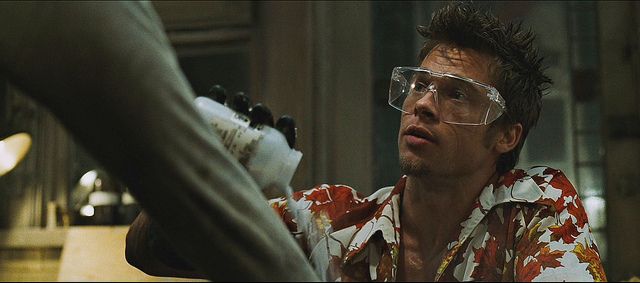 |
| Seriously, you guys, this scene made me cringe because it's exactly what I DON'T want happening to all my lovely little students... |
For
a film titled Fight Club, I was bracing myself for a level of violence that
was damn near unwatchable. Apparently,
my hypersensitivity to violence is mostly confined to war films, because I was
surprisingly accepting of the violence in this film. There is no shortage of deep purple fake
blood and plasma, to be sure, and the sound of flesh thwacking against cold
hard concrete is distinct and a little stomach churning, but the violence is
also not nearly as nonstop as you would imagine. The focal point, the main message of the
film, is much more about eschewing society’s rules (and possible repercussions
therein), and much less about violence for violence’s sake.
Fight
Club would
make a great double feature with Office Space, made the same
year. I am CERTAIN I am not the first
person to associate these two films together, but they both deal with a central
character who, tired of the cubicle life, starts to break free from American
cultural expectations. Fight
Club makes its point with wild violence and hyperbolic
antiestablishmentarianism gestures. Office
Space makes its point with funny gags and a red stapler. Two drastically different comedies, but an
intriguing double feature. At the very
least, I anticipate such a double feature would have you wishing you could
properly tick off your boss more.
Or,
in my case, it would make me angry about why guy films are so intriguing and
chick flicks are so braindead.
Arbitrary
Rating: 9/10. Ironically, considering
the overall message, I think the film starts to run out of steam in the second
half. But that doesn’t stop the whole
movie from being AWESOME!
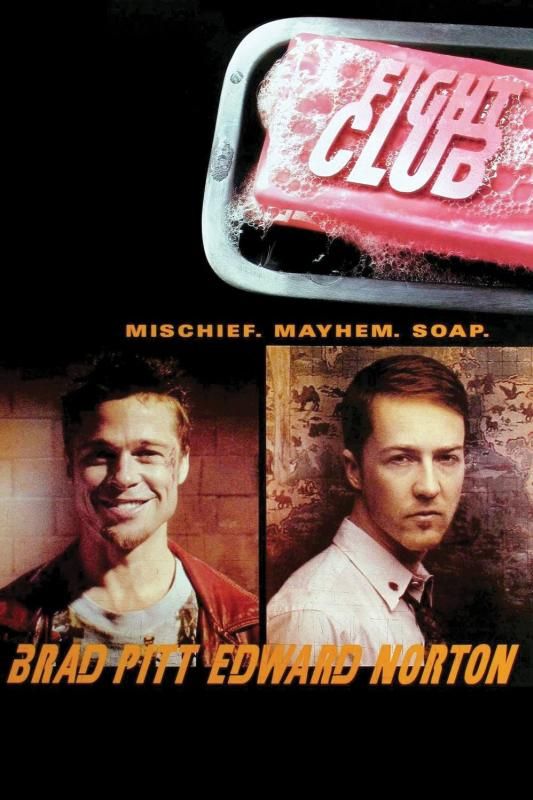
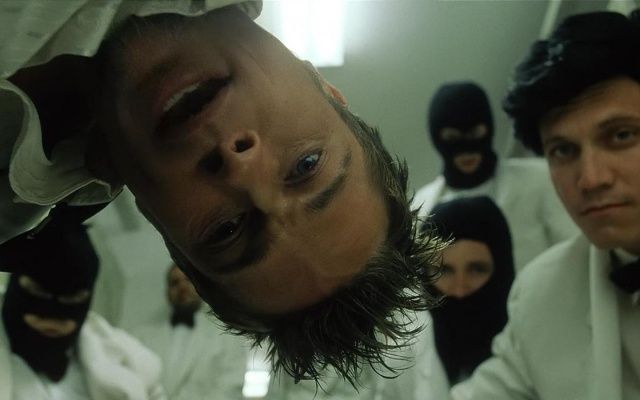
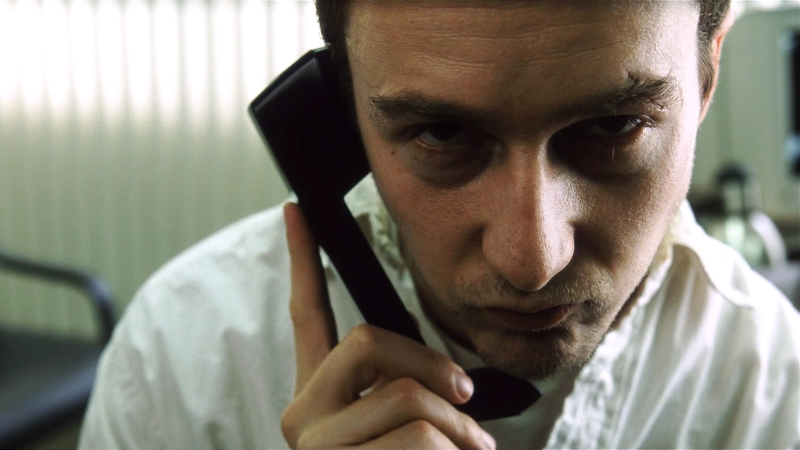

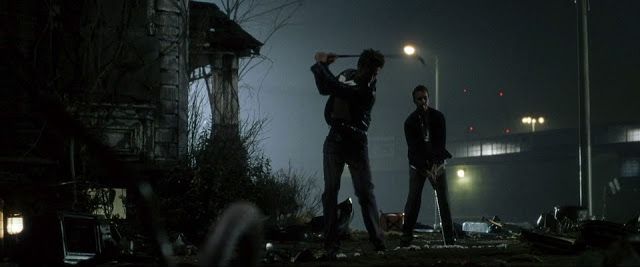
So much to talk about here. So much...
ReplyDeleteFirst, I've really made an effort to stop thinking of films as gender identity. Some of my favorite films are romances. Plenty of guy-themed movies are stupid. Movies are movies are movies. Is 12 Monkeys a guy film? I dunno--it's a science fiction film. Maybe that's traditionally a guy genre, but plenty of women like science fiction. And don't let anyone give you crap about what you haven't seen. Everyone has holes in his or her past viewing.
Second, now that you've seen Fight Club, you need to watch it a second time (if you haven't already). Yes, this is a story aimed at men, and specifically at men say 17-35, but there's a woman's story here, too. Of all of the characters who change on a second watch, Marla is the biggest revelation. She is very much the most sympathetic character the second time you see the film.
Third, after you watch this a second time, watch it with the commentary track. Your two hours listening to Brad Pitt, Edward Norton, and David Fincher discussing the creation of this film is well worth your time. One of the more interesting discussions in the commentary is about the violence in the film. They talk about how much they were excoriated for the violence (one person dies in the film) when no one said anything about The Matrix from the same year, because The Matrix was all video game violence and Fight Club is realistic. Similarly, no one complained about the violence in Braveheart or Gladiator. But Fight Club...that scene in which Edward Norton beats the living hell out of Jared Leto is brutal.
Fourth, and finally, the book is far more brutal than the film.
But yeah, I love this one.
A lot to respond to as well!
DeleteFirst up: the gender issue. Steve, I completely agree that movies are movies are movies. But I don't think everyone does. People who are even remotely serious about film don't see chick flick versus guy's movie, etc., but those for whom film is more a passing hobby, I think those genres definitely apply. I know plenty of girlfriends who will see whatever tripe is cleverly marketed in the big fat chick flick bow for that reason, and who will never delve into "guy movie" territory. Is that sad? You bet it is. I guess I'm more moaning about the commercialization angle of filmmaking rather than the actual artistic output. Did Fincher set out to make a "guy film" with Fight Club? I doubt it. Did the studio market it as a "guy film?" You bet they did.
And this pulls at a whole big mess of strings about gender equality in modern Hollywood and our culture as a whole, the lack of female directors and even perhaps female screenwriters, etc.
Although I haven't seen Fight Club since watching it (last year), I'm definitely left with the feeling that there is a tremendous amount to uncover in this film. There's A LOT going on here, and I get the sense that it rewards the viewer after multiple viewings. I've no doubt I'll see it again at some point, and thanks for the recommendation on the commentary track. Violence is such a ridiculous issue in modern Hollywood; as sad as it is, I can totally believe people making more of an issue about the violence in this movie than the others you listed.
Do you recommend the book?
With reservations. It is not an easy read. It really depends on your sensibilities. If you don't mind something that is staggeringly horrific in places, go for it.
DeleteI liken it to many books by J.G. Ballard. Nothing good ever happens in a Ballard novel.
Fight Club was specifically marketed for men, but my guess is that it was written originally with men in mind as the target audience. Nothing is ever 100%, of course, but this is a film that seems to have a gender bias in terms of overall theme.
So it doesn't exactly sound like summer reading. Not that I thought it would be, for that matter...
DeleteI liked Fight Club when I saw it, but I didn't think it was "all that". I watched with mild surprise as it started to take off with people as a "must see" movie. After reading many reviews and comments I came to understand this trend since the vast majority of people loved the surprise reveal...which then caused me more confusion, since long before the big reveal the movie literally SHOWS US the truth about Pitt's character by blipping him in and out of existence a few times early in the film. I figured this was just more evidence that people don't actually WATCH movies anymore, but simply have them on while they are doing other things. I admit that I went into this film looking for something like this to be the origin of Pitt's character, but I wasn't specifically looking for them to do that with his character's appearances.
ReplyDeleteOn the other hand, there are the rare, very positive reviews of the film I have read that make no mention whatsoever about the twist and that make it obvious that the reviewer loved the film for many other reasons. You do a very good job of outlining them here.
As for guys and gals movies, I agree that the marketing is geared that way, but it is for a very good reason: it works in bringing in the cash. I'm a guy, I love seeing action films, but I also like a ton of romantic comedies and I'm not into horror at all. I worked with a woman who recommended The Notebook to me by saying, "I cried soooooo much", but she also loved any and all science fiction movies.
I can't remember where I saw the joke, but I remember a scene where a couple is trying to decide what movie to see. He wants to watch "Shit Blows Up", while she wants to see "They Cried All Night."
A joke I do remember the source for is the film The Mating Habits of the Earthbound Human. In it the alien narrator explains the pre-mating rituals of humans, including going to movies. He says that the female prefers movies where one person dies very slowly (cue a scene where the woman in crying her eyes out while the guy is looking at his watch), then the narrator continues by saying that the male prefers movies where many people die very quickly (cue a scene with the guy having a "this is awesome" look on his face while the woman is cringing in her seat.)
Very, VERY true about people not really paying attention when they watch movies. Preach it, Chip! And in addition, thank you very much for commenting on how I treated the reveal. It was definitely a focus of mine. For my part, I had this movie spoiled for me in advance (sad face), so my appreciation of the movie was not at all related to any shock or surprise. I think there are very interesting questions being asked in Fight Club, and Fincher is definitely a bold filmmaker; I responded very well to both those things.
DeleteLike I mentioned in my response to Steve above, the gender issue is so beyond cut and dry, and thank you for bringing up the marketing/financial aspect, because YES, AGREED, that's definitely a HUGE part of why certain movies are marketed the way they are. You better believe the studios know what makes women open up their wallets versus what will make men do the same. Again, I don't think I have quite the capacity, intellectual or otherwise, to go into a full-length thesis on the topic, but there are many factors behind the divide of "chick flick" versus "guy movie."
That joke made me laugh. "Shit Blows Up" versus "They Cried All Night."
I.
LOVE.
THAT.
Too perfect. Now I want to find a cartoon of that and post it.
Also totes perfect? Dying slowly versus dying quickly. I love it. You made me smile today, thank you!!!
If you want to see the second joke, you can watch it here at 34:45.
Deletehttp://www.youtube.com/watch?v=Dis7yI7k5Tc
Once again we agree on the awesomeness of the movie in question!
ReplyDeleteRe: "guessing it was some sort of hydroxide" - I'm almost positive that Pitt says he's sprinkling lye on Norton's hand, so it's certainly a hydroxide, right? Sodium or potassium? Or are you just referring to the fact that "lye" is an archaic, inexact, unscientific word and could be lots of other things not mentioned on wikipedia? ;-)
I think your observations about "chick flicks" versus "guy flicks" are compelling and I could probably spend hours and hours dissecting all of those embedded gender normative concepts, but I might also argue the point that Fight Club transcends those boundaries. I mean yes, it's a violent movie about dudes dealing with dude issues, but it also has a central love story, however off-kilter it may be. The love story isn't tacked on, either, it's pretty fundamental to the plot and its resolution. And Marla herself is a crazy complex three-dimensional character. Something for everyone!
Also, more jokes about men and women and the distance between the sexes: http://www.nhne.com/storiesquotes/0010.html
Another thing I love about Fight Club, which I didn't get around to in my review, is how freaking quotable it is. (I guess I did use a quote as the title of my post, and I can do pretty much that whole scene from memory.) Countless are the times I've worked "And now, a question of etiquette" or "*Babies* don't sleep this well" or "Where'd you go, psycho boy?" into conversation. I've never read the book myself (though I've read other Palahniuk), but a friend of mine did, and apparently there are tons more quote-worthy lines in it. Back around the turn of the millennium when everyone was on AIM and would put up personalized away messages with quotes and jokes and stuff, my friend had a quote from Fight Club the novel for a while, which was from early on when the narrator is suffering through his dull drone life. I'm trying to recall it from memory, so this may not be verbatim, but it was something like, "I seriously considered - and I'm not proud of this - getting myself a dog and naming him Entourage." For as dark and cynical and brutal as Fight Club gets, it really is funny down to its cracked and broken bones.
- Sunny D
As a chemistry teacher, I get geekily excited by such things as saponification in film. So yes, I take "lye" as a fairly generic term. I've had a couple serious chemical burns; luckily I've never had a major hydroxide spill on my skin. I've spilled plenty of acid, though; what's worst is that I'm still not certain what caused my worst chemical burn as I wasn't the one who spilled the offending substances. Someone else had spilled them and not cleaned them up; I didn't see, and suddenly my forearms were in incredible pain. Anyway. Rambling personal anecdote about working in chemistry labs over.
DeleteThere is so much behind gender, too much to distill into a single movie review. This was just the film that finally put me over the edge. I wholeheartedly agree that Fight Club is good enough, strong enough, to go beyond being a "guy film" (or as I called it above, penis picture), but when you look at the cast (mostly male) and the violent themes that instill male bonding, if you had to categorize it, it would definitely be a "guy film." I guess I was just venting my frustration even that such a divide exists, and how predictable it has become. I just... and now I'm too tired to say anything remotely cogent on the topic. It just frustrates me, really.
I had read that alternating paragraph joke before, but not in awhile. That's a good one, as is the Roger/Elaine bit!
Fight Club has an incredibly smart script (and smart source material). I think I'd need to see it a few more times to start quoting it, but it's such an intriguing film, I wouldn't have any problem with that.
And yes, it's definitely funny too. Great film!!!
adidas stan smith shoes
ReplyDeletechrome hearts wholesale
http://www.yeezyboost350.uk
tiffany jewelry
cheap air jordan
ralph lauren uk
tiffany & co
http://www.cheap--jordans.us.com
michael kors handbags clearance
kobe shoes
supreme
ReplyDeletesupreme new york
golden goose
christian louboutin outlet
supreme new york
hermes
kyrie 6
curry 5
louboutin outlet
kyrie 5 spongebob